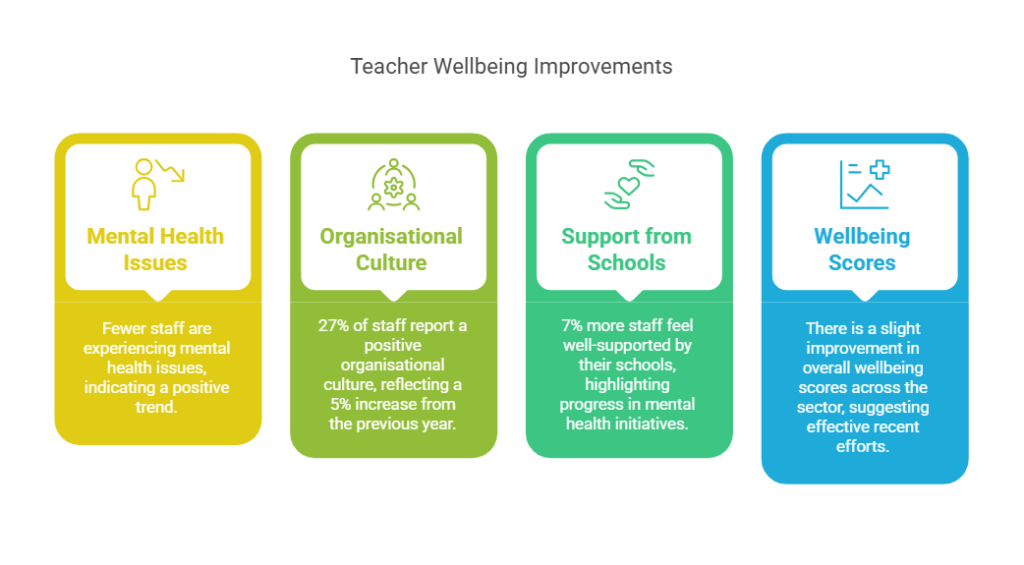
A positive classroom environment enhances teacher wellbeing and student engagement.
Teacher wellbeing in the UK is at a crossroads. While small but promising signs of improvement have emerged, stress and mental health struggles remain deeply ingrained in the education sector. The latest Teacher Wellbeing Index 2024 sheds light on these issues—so what does this mean for educators, and how can schools step up to support their staff?
As the UK's leading education recruitment platform, JobsinED recognises the critical importance of understanding and addressing these challenges to support both current educators and those considering a career in education.
The State of Teacher Wellbeing: A Mixed Picture
The eighth annual Teacher Wellbeing Index, conducted between June and July 2024, surveyed over 3,000 education professionals across the UK, providing key insights into the mental health and wellbeing of our workforce. While some positive trends have emerged, the findings also highlight ongoing pressures faced by educators.
Signs of Hope
For the first time in several years, there are some encouraging developments:

- Fewer staff experiencing mental health issues – a statistically significant improvement.
- 27% of staff now report a positive organisational culture – a 5% increase from 2023.
- 7% more staff feel well-supported by their institutions, showing progress in school-based mental health initiatives.
- A slight improvement in overall wellbeing scores across the sector, indicating that recent efforts may be making a difference.
🔎 Looking for a school that prioritises staff wellbeing? Explore our latest opportunities.
Persistent Challenges
Despite these improvements, serious concerns remain:
- 78% of education staff report experiencing work-related stress.
- 77% face work-related mental health symptoms, with many struggling to cope.
- 50% believe their organisation’s culture negatively impacts their wellbeing.
- More than one-third score below 40 on the Warwick-Edinburgh Mental Wellbeing Scale, indicating potential risk of major depression.
The Behavioural Context
Classroom environments have become increasingly challenging, with rising student disruption and difficult parent interactions adding pressure:
- 57% of staff report increased classroom disruption.
- 63% have experienced more challenging student behaviour overall.
- 51% noted an increase in verbal abuse from students.
- 33% reported rising verbal abuse from parents.
The emotional toll of these challenges is immense, leaving many educators feeling drained, unsupported, and at risk of burnout.

Support Systems Under Strain
A key concern from the report is the lack of adequate support from external organisations, making it harder for educators to address student wellbeing concerns effectively:
- 69% of staff feel they receive insufficient support from public bodies such as CAMHS, social services, and the NHS.
- 85% of those receiving inadequate support believe it negatively impacts student wellbeing.
- School leaders, in particular, report overwhelming workload and stress.
The Impact on Different Roles
Senior Leaders:
- 84% report experiencing stress, with many at risk of burnout.
- Higher rates of acute stress and mental health challenges compared to other roles.
- 76% feel they receive insufficient support from public bodies.
Teachers:
- 78% report work-related stress.
- 36% have experienced mental health issues in the past year.
- 69% feel inadequately supported by public bodies.
Support Staff:
- 61% report stress, though slightly better wellbeing scores than teachers.
- 46% report insufficient support from public bodies.
🔎 Considering a change? Browse leadership opportunities in supportive schools.]
Regional Variations
The report highlights geographical differences:
- Northern Ireland: The highest percentage of staff feeling supported (42%).
- Scotland: The highest increases in challenging behaviour.
- England & Wales: Similar patterns in most wellbeing metrics.
Supporting Education Professionals: The Way Forward
At JobsinED, we are committed to helping educators find workplaces that prioritise wellbeing. Here’s how we can support you:
Career Progression Support
- Access to schools with proven positive workplace cultures.
- Leadership opportunities in schools that prioritise staff wellbeing.
- Guidance on career development.
Professional Development
- Links to mental health resources.
- Access to wellbeing support networks.
- Professional development opportunities to build resilience and career satisfaction.
Workplace Culture Assessment
- School culture indicators included in job listings.
- Staff wellbeing policies highlighted in job descriptions.
- Direct connections with supportive institutions.
Taking Action: Your Next Steps
If you’re concerned about workplace wellbeing, consider these steps:
Evaluate Your Current Support
- Assess your workplace’s wellbeing initiatives.
- Review available mental health support systems.
- Explore professional development opportunities.
Research Potential Employers
- Use JobsinED’s school profiles to understand school cultures.
- Check wellbeing policies and available support.
- Connect with current staff through our network.
Prioritise Wellbeing in Your Job Search
- Look for schools with strong staff wellbeing programmes.
- Consider locations with better support systems.
- Use our advanced search filters to find the right opportunities.
Resources and Support
If you are struggling with workplace wellbeing, help is available:
- Mind Workplace Mental Health Resources
- NHS Mental Health Support
- Education Support Helpline: 08000 562 561

Conclusion
The 2024 Teacher Wellbeing Index reveals both progress and ongoing challenges in the education sector. While some improvements are evident, the data clearly indicates that more must be done to support educators.
At JobsinED, we are dedicated to connecting teachers and leaders with schools that prioritise staff wellbeing. If you're looking for a role in a more supportive environment, we’re here to help.
🔎 Ready to explore opportunities in more supportive schools? Start your search today.
For regular updates on education careers and wellbeing support, follow JobsinED on LinkedIn or sign up for our newsletter.
🔎 Need personalised career advice? Contact our specialist education recruiters.
